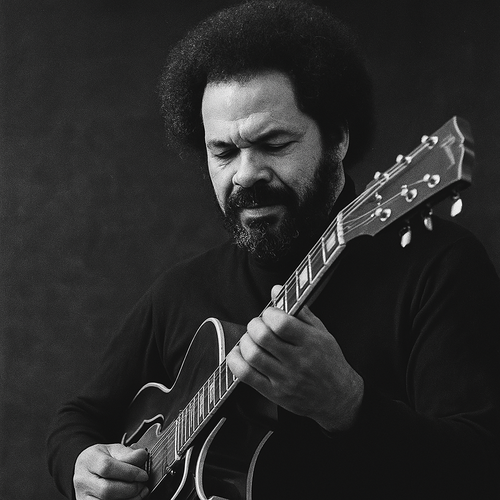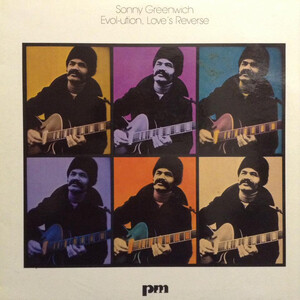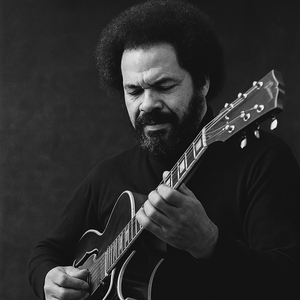Greenwich, Sonny Quartet
Websites:
No
Origin:
Hamilton, Ontario - Montréal, Québec, 🇨🇦
Biography:
Sonny Greenwich: A Guitar from the Stars
In jazz circles, Sonny Greenwich is a legend. Over a career spanning more than six decades, he has captivated audiences with his visionary style, his musical intensity, and the profound sincerity behind every note.
Sonny Greenwich was born in Hamilton, Ontario, in 1936, and grew up in Toronto where his early musical journey began. His father, a jazz pianist, introduced him to music, but it was the powerful tenor saxophone sound of Sonny Rollins that became his first true inspiration. "When I heard his big sound, I said to myself, this is what I want to get on the guitar, this sound, this kind of feeling!" he once said. That idea—to play guitar like a horn—guided his development, leading him toward the exploratory language of Coltrane, the modal abstraction of Miles Davis, and the harmonic richness of Bill Evans.
From the beginning, Greenwich was a seeker—not just of musical style, but of spiritual and emotional truth. His influences spanned far beyond jazz: from classical composers like Ravel, Debussy, and Hindemith, to abstract painters like Paul Klee, to the human voice itself, particularly the expressive phrasing of Maria Callas. His chordal ideas were as likely to be shaped by visual art or literature as by other guitarists. "The solo structures of my playing were based on an interpretation of the work of cubist artist Paul Klee, where I saw the fretboard in diagrams," he said. Even in his youth, he was drawn to statements by Charlie Parker about the value of classical music, and pursued similar paths of study.
"With Greenwich, the music is more than the sum of its influences."
"His originality lies in his view of the world, which he injects into his music."
Greenwich first came to major attention in the early 1960s, when both Horace Silver and Lee Morgan independently brought his name to the attention of Alfred Lion at Blue Note Records. From there, a powerful momentum began to build. In 1968, he led a quartet at New York's famed Village Vanguard with pianist Teddy Saunders, bassist Jimmy Garrison, and drummer Jack DeJohnette. The following year, he played in Toronto with Miles Davis, Wayne Shorter, Chick Corea, Dave Holland, and Tony Williams at the Colonial Tavern—a legendary gathering that signaled his arrival among the jazz elite. He shared a bill with Davis again in 1970 at Massey Hall.
The press has often described Greenwich’s musical command as absolute. His playing evokes both serenity and fire, creating an emotional contrast that holds listeners in thrall. His music is often described as cosmic, or spiritual—but it's also deeply human. “It’s like an ocean,” he said. “You have to have the two things—the storm and the calm that comes after—and the one thing helps the other express itself. It’s music that has a spiritual basis to it… trying to uplift people somehow.”
Critics have described his sound as "a blend of lyricism with a beautifully modal melodic line making the swing of Sonny Rollins dance." That blend of elegance and fire has defined his legacy. “This album,” one liner note observed, “captures a sound that seems to have always existed, a sound that gives credence to the feeling of timelessness.” It is a sound that has inspired not just jazz musicians, but rock and classical players as well. Even progressive rock bands like Pink Floyd and Genesis have cited Greenwich as an influence.
Through the 1970s and 1980s, Greenwich led a variety of ensembles and maintained an active presence on the festival and club scene across Canada and the U.S. From 1983 to 1988, he fronted a quartet with Fred Henke, Ron Seguin, and Andre White. In 1989, he performed in a benefit concert alongside Canadian dance artist Margie Gillis, closing the evening with a collaborative piece he composed especially for the event.
Beginning in the early 1990s, Greenwich turned more of his attention to composition and ensemble writing. He formed a quintet, sextet, and even a nine-piece band with brass and percussion for a series of productions with CBC’s Jazz Beat. Around this time, he coined the phrase “Heavenly Flights Over Earthy Rhythms” to describe the evolving aesthetic of his Universal Language Band—an ensemble designed to explore freer forms of group improvisation while maintaining a sense of lyrical and spiritual purpose.
By 1995, he had re-emerged more publicly than at any time since the early '70s. He performed extensively across Canada, collaborated with artists like Jane Bunnett, Alain Caron, and Hilario Duran, and co-led a project with his son, guitarist Sonny Greenwich Jr. A 1996 documentary titled It Ain’t All Jazz, produced by Sussex Productions, aired on Bravo and CFCF, offering rare insight into his life and musical philosophy.
A lifelong resident of Montreal since the mid-1970s, Greenwich remains a towering figure in Canadian jazz. His influence is far-reaching—not just among fellow jazz musicians, but also across rock, classical, and experimental scenes. His playing carries the weight of lineage. As one critic put it, “Greenwich’s playing has a sense of history. The history of Black American music, and the history of his own career.”
He is the only Canadian guitarist included in Francis Wolff’s The Blue Note Years, and his name appears in The New Grove Dictionary of Jazz, The Canadian Encyclopedia, Jazz Lives by Gene Lees, and Mark Miller’s definitive biography Of Stars and Strings. He has also been featured in Jazz in Canada: Fourteen Lives and Who’s Who of Jazz in Montreal.
In 2006, Sonny Greenwich was named a Member of the Order of Canada, one of the country’s highest civilian honors, and in 2021, he received the Canadian Jazz Master Award, recognizing a lifetime of contribution to the art form.
“He has spent his life trying to make the guitar sound less like a guitar and more like the music he hears inside himself.”
And yet, even with all the accolades, Sonny Greenwich has always kept his focus on the essence of the music:
“It’s not some kind of preaching,” he once said, “but a feeling of beauty I have, that I express so that someone else can feel it.”
-Robert Williston




